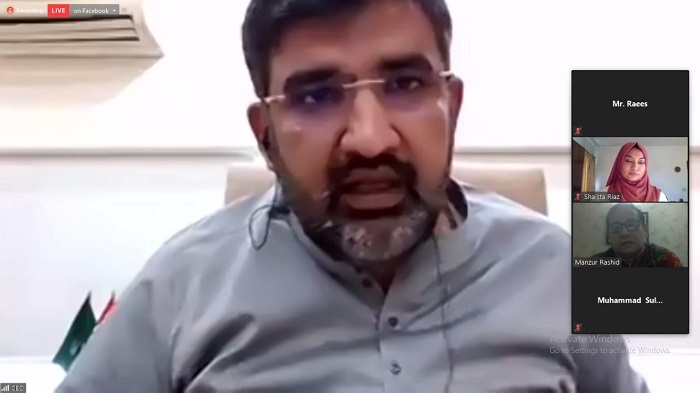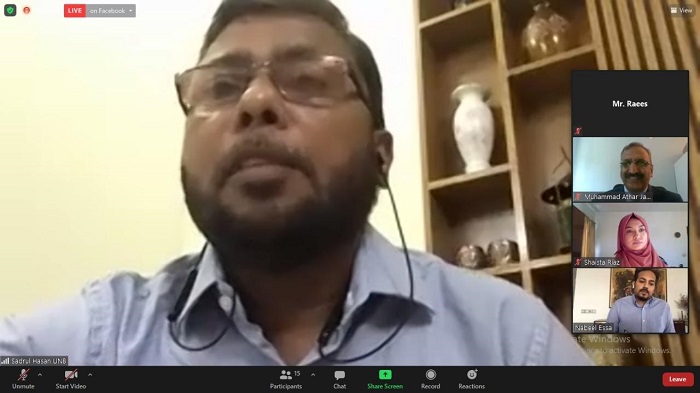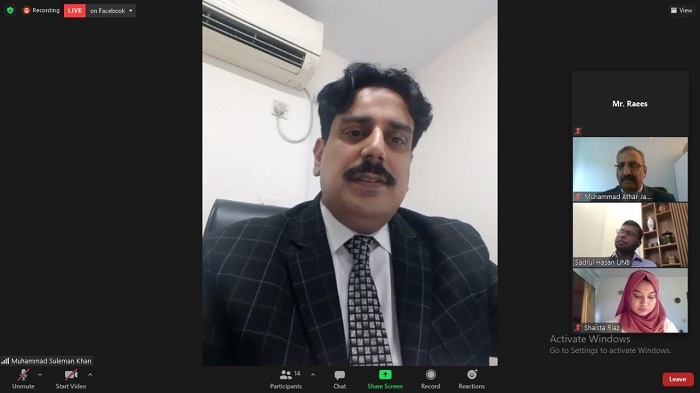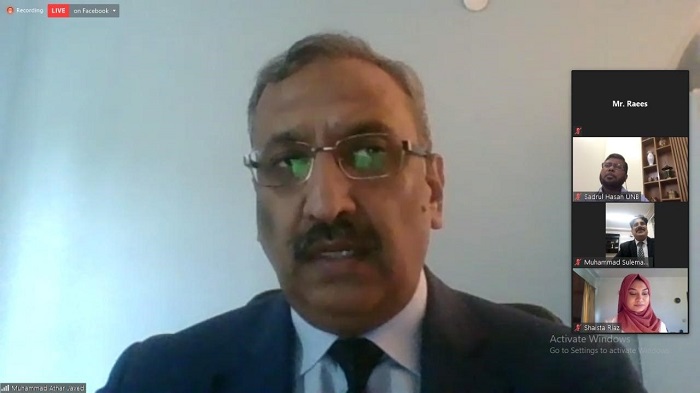The Pakistan House, an Islamabad-based think tank of International Affairs, organized an International Webinar on, “Pakistan Bangladesh Economic Relations: Future of Cooperation” on Monday.
Ms. Shaista Riaz, Research Associate of Pakistan House moderate the webinar. She highlighted the reasons behind holding this very important event, and reflected that if bilateral ties are to progress, both Islamabad and Dhaka must look forward. Pakistan and Bangladesh are linked to each other by bonds of history, culture, and faith.

Ms. Shaista Riaz said that bilateral trade between the two countries has been growing slowly over the past years, Pakistan and Bangladesh both countries have decided to finalize a bilateral Free Trade Agreement. FTA will pave the way for opening trade opportunities and will help the expansion of trade between the two countries.

The Chief Guest: H.E. Imran Ahmed Siddiqui, Pakistan’s High Commissioner to Bangladesh, stated that Pakistan House has taken a very important initiative to arrange this webinar on a very relevant topic. It will help explore new avenues of cooperation between the two countries. The transformational economic vision of Pakistan’s leadership centers on developing Pakistan as a hub for commercial and investment activities and into a reliable node connecting various sub regions of Asia. Pakistan and Bangladesh share commonalities of vision on many important issues ranging from peace and security to sustainable development, poverty reduction and climate change. The two states are partners in achieving shared objectives as part of many multilateral platforms including UN, OIC, SAARC and D-8. Many Pakistani businesses have invested in Bangladesh and many Pakistani professionals contributed to the development of Bangladesh particularly its garment sector. There are certain dormant consultative mechanisms at the government level which need to be revived as soon as possible such as Joint Economic Commission. This platform remained inactive for many years, however governments on both sides have agreed, in principle, to restart the process. This is important for addressing the hurdles that businessmen and exporters face in enhancing their businesses. Bangladesh is among the top 10 exporting destinations of Pakistani products, which include cotton, yarn, fabric, leather, inorganic chemicals, vegetables and electronics. There is a need to promote better and more frequent interaction between the private sectors of the two countries to enhance trade which is mutually beneficial. Bangladesh economy is at a stage where the businesses can move out and invest in other countries. Bangladeshi businesses may explore opportunities being offered by CPEC which can also be used as a transport link if Bangladesh is sourcing its imports from Western and Central China. Let us work on creating Pakistan-Bangladesh Business Council for stronger relations between businesses and better business coordination. Bilateral relations even between the two closest countries are not always friction free. There may be some problems between Pakistan and Bangladesh too. But fortunately the leadership in both Pakistan and Bangladesh is committed to moving ahead and to promoting better relations. We experts must play our part too in this regard.

Mr. Manzur Rashid, Business Director of ACI Chemicals Limited Dhaka, said that Bilateral trade is very important for the sustainability of the States. Countries need to have ties with each other. Pakistan has become very serious regarding building relations with Bangladesh in the last few years. We have found great fabric and yarn manufacturers from Pakistan. Bangladesh has a very small window of opportunities available to it. Although there are issues between Pakistan and Bangladesh, the businessmen on both sides understand the importance of bilateral trade. CPEC holds great importance and this opportunity will bring prosperity to Bangladesh as well because 30%-40% of the import is coming from China. Using CPEC as a channel, Pakistan should promote it to Bangladeshi businessmen. Despite the issues, business is still doing well. Pakistan and Bangladesh need to move forward from the traditional trade to other domains as well including technology and tourism. Bangladesh will also make it easier for Pakistani citizens to travel and build communication.

Engr. Ihtesham Javaid, President Faisalabad Chamber of Commerce and Industry, remarked that Faisalabad is Pakistan’s 3rd largest city which has a share of 25% of the economy of Pakistan and is the biggest industrial state in the country. We have seen that Bangladesh has made remarkable achievements by enhancing its textile and garment industry. Both countries have the potential that needs to be explored and offer new opportunities for businesses. I suggest that Bangladeshi investors should come to Pakistan and invest by establishing industries. New routes are available now for Bangladesh to reach Pakistan, such as through China. These routes must be utilized for increasing bilateral trade. In 2020, the volume of bilateral trade was $644 million, which was very little considering the market and opportunities. The good news is that the volume of trade has increased significantly in 2021, as a rise in trade between Pakistan and Bangladesh has been reported. Pakistan offers opportunities for cutting down the cost of many products through the facilities it can offer to Bangladeshi investors and industrialists, such as by providing cheap labour and a secure environment. The current GDP growth rate of Pakistan is 3.9%, and it can offer job opportunities to 2.4 million people. Bangladesh and Pakistan, both are developing countries, faced with similar kind of conditions, thus, both countries should take measures and collaborate in enhancing their bilateral trade ties.

Mr. Nabeel Essa, Director Tasho Enterprises Limited Dhaka, mentioned that Over the past few years, opportunities have come up from regular commodity trade to information technology and infrastructure. Other than just yarn and fabric, we need to focus on other aspects of building communication as well including promoting Bangladeshi artisans, brands, MNCs and business stakeholders.
There needs to be a way to communicate not only on the government-to-government level but in the business community as well. 65% of the Bangladeshi population is involved in Agriculture. Bangladesh has the potential to enhance and promote agriculture outside the State too with the help of Pakistan. King of mangoes comes from Pakistan but Bangladesh has its own 500 types of mangoes. Competition always helps the countries to thrive and Bangladesh sees this competition on positive terms. Pakistan exports potatoes to Russia and a few Pakistan businesses have also helped to pave a way to export potatoes from Bangladesh as well. 80% of the Bangladeshi population is youth and they are willing to be employed by the business community. We need to help the youth on both sides to connect not only nationally but regionally and globally.

Mr. Sadrul Hassan, Special Correspondent UNB, Dhaka, BD, appreciated the endeavour that Pakistan House, and said that topic of bilateral trade between Pakistan and Bangladesh is vital. It is important to understand that politics dominates everything. The phone call between Pakistan’s Prime Minister and Mr. Imran Khan Bangladesh’s Prime Minister Mrs. Sheikh Hasina was very important, especially in terms of establishing economic ties. Undeniably, Pakistan and Bangladesh have huge potential that remains untapped due to many problems. It is about time that both countries should take the opportunities to enhance their ties, and expand their bilateral trade relations. Similarly, it is also important to address the hurdles that are faced by both countries in this regard. For instance, the ties Bangladesh faces in trade relations include the absence of a direct shipping line to Pakistan and other tariff and non-tariff barriers. Efforts are required from both sides to address their problems. I suggest that efforts need to be made firstly at the government level and then at the level of businesses. In this regard, contact holds crucial importance. Leadership from both countries need to establish direct and regular contact. This will eventually increase the people to people and business to business ties. In the end, I would like to make two recommendations. Firstly, Pakistan and Bangladesh need to work on the sector of tourism, such as launching joint ventures and secondly, they need to work on the textile sector.

Mr. Suleman Khan, the Commercial Counselor, Embassy of Pakistan, Dhaka, Bangladesh, highlighted that Pakistan and Bangladesh are like brother countries. Bilateral and free trade without any hurdles is very important for the state economy. South Asian Free Trade Area (SAFTA) is an agreement reached on January 6, 2004, at the 12th SAARC summit in Islamabad. It created a free-trade area of 1.6 billion people in Afghanistan, Bangladesh, Bhutan, India, the Maldives, Nepal, Pakistan, and Sri Lanka to reduce custom duties of not all traded goods but selected items to zero by the year 2016. Pakistan and Bangladesh both get the advantage from SAFTA.
Talking about import and export between both the states are improving with time. Pakistan exports to Bangladesh were US$583.44 Million during 2020, according to the United Nations COMTRADE database on international trade. Bangladesh is the overall top tenth export market of Pakistani products. Fabrics, cotton, plastic, leather, fruits, dates are the products exported to Bangladesh. Jute, medicines are many other products imported by the Pakistani market. Some issues need to be addressed that there should be a simple visa procedure between both the countries, there are no direct shipping lines between Pakistan and Bangladesh to import and export easily. Business is affected because of no direct connection, this causes late consignment, and hurdles for importers and exporters. Bangladeshi people are interested to visit and explore Pakistan same is the case on the other Pakistani side.

While concluding the International Webinar, Mr. Muhammad Athar Javed, DG Pakistan House, said that Bangladesh’s economy has made a tremendous effort to boost their economy in the past few years. It is important to understand that both countries can help each other and grow each other’s economies. Pakistan and Bangladesh have the potential to work together but we need to have an open dialogue with public and private partners. This was one initiative to discuss bilateral relations and a unique opportunity for the citizens of two countries to promote bilateral and diplomatic relations.
